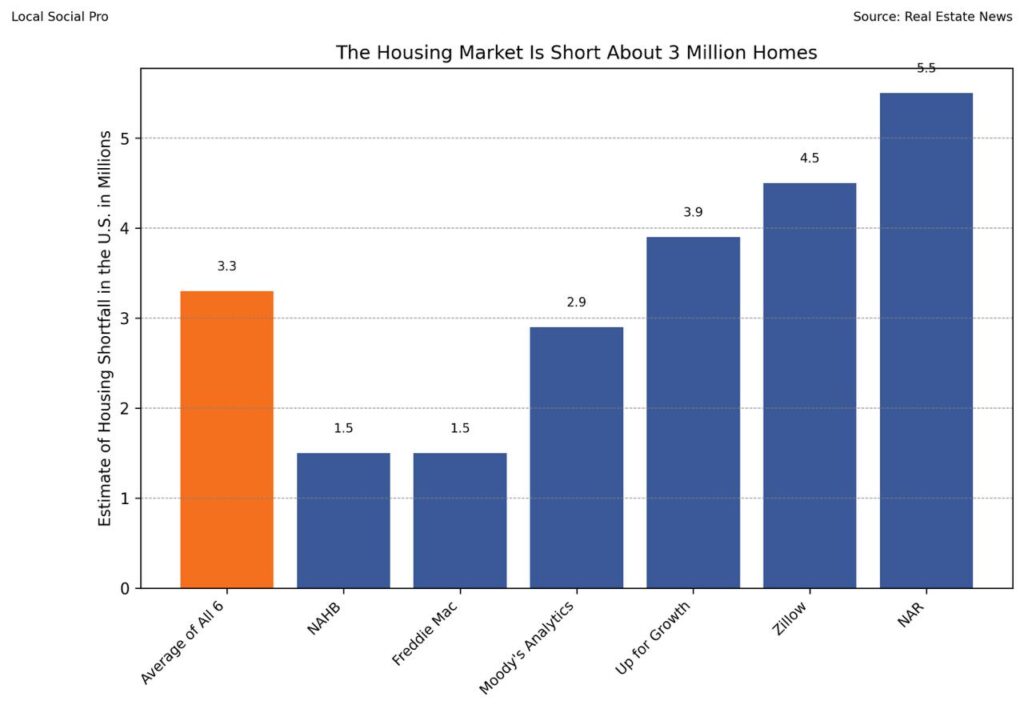Introduction: If you’re thinking about selling your home, you might be wondering how much demand exists for houses in today’s market. Despite a slight increase in available homes compared to last year, there is still a major shortage of housing, with more buyers than properties. This creates a favorable environment for sellers, with increased attention and competition for homes on the market. By understanding the causes and implications of this shortage, you’ll see why now could be an excellent time to list your home.
Why Is There a Shortage of Homes?
The current housing shortage has been years in the making. Several key factors contribute to this imbalance, each affecting the availability of homes in the United States. Here’s a look at why the demand for homes far exceeds the supply:
Underproduction of Homes for Over a Decade For more than ten years, the housing industry has been unable to keep up with demand. While recent years have seen improvements, such as the 1.4 million homes built in 2022 (the highest number since the Great Recession), this still falls short of meeting the demand. According to Zillow, there were 1.8 million new U.S. households created that same year, which means the construction rate didn’t even cover new family formations, let alone reduce the existing housing deficit. The underproduction problem stretches back to the early 2000s, and as a result, the U.S. is now facing a significant housing gap.

Rising Costs of Construction Materials and Labor Building a home has become more expensive due to increased costs of materials, labor shortages, and the lingering effects of pandemic-related supply chain disruptions. The costs of essential materials like lumber and steel have surged in recent years, making it harder for builders to deliver affordable homes. Labor shortages in construction, compounded by an aging workforce and lower immigration rates, have further strained the industry. In some areas, these challenges have reduced new housing developments or slowed their completion, exacerbating the shortage.
Regional Imbalances in Housing Supply and Demand Some parts of the country feel the housing shortage more acutely than others. Popular areas, often where job growth is booming, tend to experience more demand for housing than they can meet with new construction. For instance, fast-growing cities and metropolitan areas often struggle with limited housing inventory as people flock to these places for work and lifestyle reasons. The limited issuance of building permits in these regions, coupled with a high demand, leads to even tighter markets and drives up prices, putting additional pressure on already limited housing stocks.
How Big Is the Housing Shortage?
The shortage is not just a minor gap; it’s a crisis-level issue affecting millions of prospective homeowners. According to Real Estate News, the United States faces a shortfall of approximately 3.3 million homes. This estimate, based on expert insights, highlights the scale of the problem. And it’s not just about meeting today’s demand—the future need for housing is expected to grow substantially.
Research from John Burns Research and Consulting (JBREC) predicts that over the next decade, the U.S. will require around 18 million new homes. This projection includes homes for new households, second homes, and replacements for aging or uninhabitable properties. This indicates that the current housing shortage will likely persist for years, creating a favorable environment for those looking to sell.
Why the Shortage Benefits Sellers
So, what does this mean if you’re thinking about selling your home? Here are several ways the shortage can work in your favor:
Increased Competition Among Buyers With more buyers than available homes, those who are looking are likely to compete aggressively. This means that your home could receive multiple offers, and serious buyers may be willing to bid higher to secure a property. In a competitive market, buyers often come prepared to make quick decisions, which can lead to a faster sale process and better offers.
Upward Pressure on Home Prices When demand outpaces supply, prices naturally rise. The current shortage puts upward pressure on home values, allowing sellers to potentially receive more than they would in a balanced market. If your home is in good condition and priced competitively, you could attract premium offers, helping you maximize your profit from the sale.
Your Home Stands Out More In a market with limited inventory, buyers have fewer options to choose from. This shortage means your home is more likely to attract attention, especially if it’s move-in ready and well-presented. By working with a skilled real estate agent, you can ensure your property is positioned effectively to appeal to eager buyers, increasing the likelihood of a swift and successful sale.
Tips for Selling Your Home in a Tight Market
While the shortage works in favor of sellers, it’s still essential to have a solid strategy in place to make the most of the opportunity. Here are some tips to help you maximize the impact of selling in today’s market:
Set the Right Price Pricing is critical, even in a seller’s market. A property priced too high can still deter buyers, while a competitively priced home will attract more attention and could spark a bidding war. Work with a knowledgeable real estate agent who can analyze local market trends and determine an optimal price that encourages interest while maximizing your return.
Prepare and Stage Your Home Even in a market where inventory is low, first impressions matter. Make sure your home is clean, well-maintained, and visually appealing to prospective buyers. Simple updates like a fresh coat of paint, landscaping, and staging can help your home stand out, giving it a competitive edge.
Leverage Professional Marketing A good agent will create a comprehensive marketing plan to promote your home. This can include professional photography, virtual tours, and a strong online presence. In a market where buyers are hungry for homes, having professional marketing can amplify your home’s appeal and ensure it reaches the right audience.
Be Ready to Negotiate With more buyers vying for fewer homes, it’s common to receive multiple offers. Be prepared to evaluate each offer carefully and consider factors beyond just the price. Sometimes, buyers may be willing to accommodate other terms, such as flexible move-in dates or covering additional closing costs, to make their offer more appealing.
Why Working with a Real Estate Agent Matters
In a competitive market, it’s crucial to have expert guidance to help you navigate the selling process. A knowledgeable real estate agent brings local market insight, pricing expertise, and marketing skills that can enhance your property’s appeal and streamline the sale. They understand the dynamics of the housing shortage and can provide a tailored strategy that aligns with both national trends and the specifics of your area. Whether you’re aiming for a quick sale or hoping to secure the best possible price, an experienced agent can help you achieve your goals.
Bottom Line: Selling in Today’s Market Puts You in Control
While more homes are on the market compared to last year, the overall shortage means that demand still exceeds supply, creating an advantageous environment for sellers. If you’re ready to sell, you’re in the driver’s seat, with increased buyer interest and favorable market conditions working in your favor. However, each market is unique, so it’s essential to partner with a trusted real estate professional who understands local trends and can guide you through the process.
Conclusion: Take Advantage of the Market Today
The housing shortage shows no signs of immediate resolution, and demand is projected to grow in the coming years. For homeowners considering selling, this shortage offers a unique opportunity to attract motivated buyers, potentially secure higher offers, and achieve a successful sale. Don’t wait—connect with a local real estate agent to discuss your options and capitalize on today’s market dynamics. With the right approach, you can make the most of this seller’s market and take the next step in your real estate journey with confidence.
Follow Hashtags: #LocalSocialPro

 Lauren Labossiere
Lauren Labossiere 













